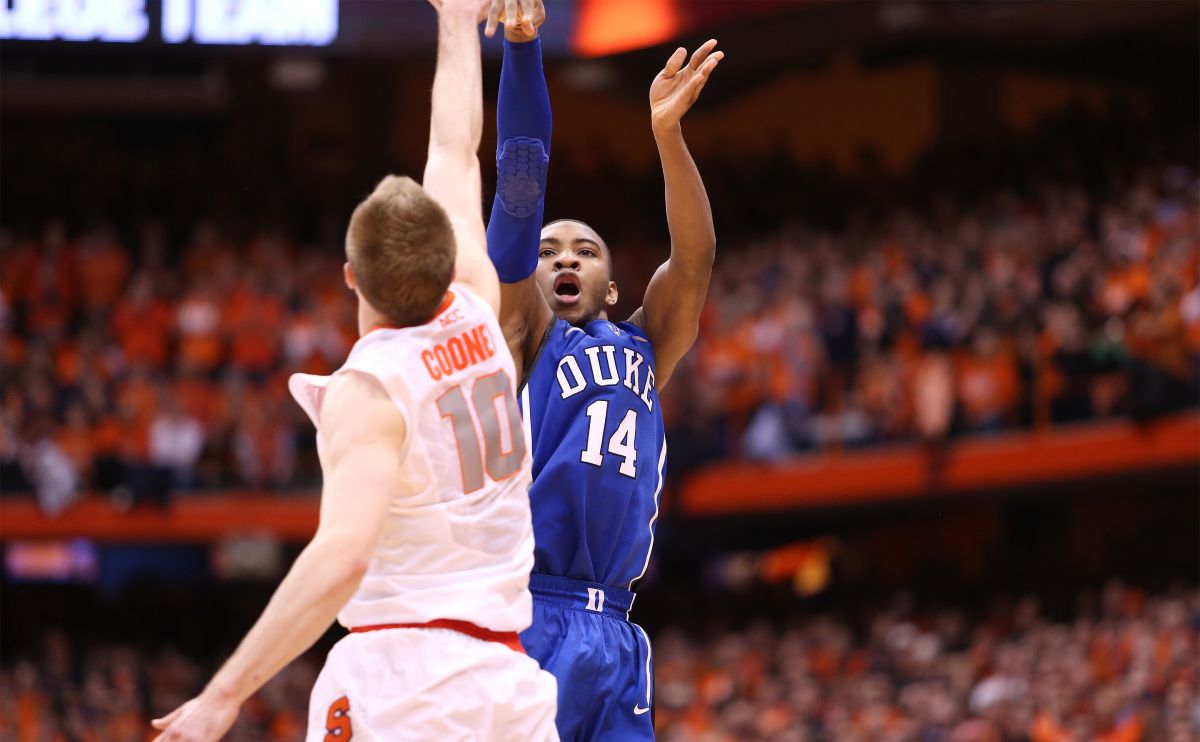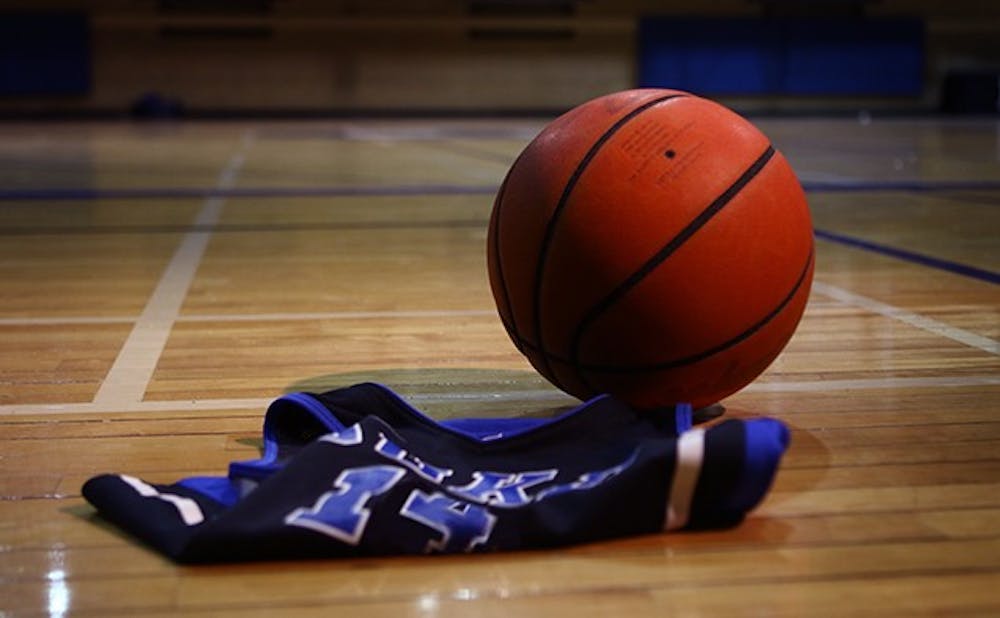Rasheed Sulaimon's dismissal from the Duke basketball program is clouded by allegations of sexual assault, which surfaced nearly a year before he was released from the team in January. Multiple sources close to the situation have confirmed that members of the athletic department were made aware of the allegations as early as March 2014.
The Duke men's basketball department has not provided a detailed explanation of the dismissal, which was the first in head coach Mike Krzyzewski's 35 years at the helm of the program. Sulaimon, a junior, was dismissed from the Duke basketball team Jan. 29 after he “repeatedly struggled to meet the necessary obligations,” Krzyzewski said in his official statement.

Sulaimon's dismissal came not from a singular incident, but was the result of multiple actions detrimental to the program, Matt Plizga—the men's basketball sports information director—told The Chronicle the day of the dismissal.
READ: Sulaimon's dismissal comes after turbulent last 2 seasons
The Duke athletic administration declined to speak with The Chronicle after multiple attempts were made to discuss the allegations.
The allegations
Separate allegations of sexual assault by Sulaimon came from two female students in the 2013-14 academic year. Both students voiced allegations publicly, but neither filed a complaint through the Office of Student Conduct or took legal action through the Durham Police Department. The students declined to discuss their allegations with The Chronicle.
In October 2013, a female student said in a large group session at the student-led diversity retreat Common Ground that Sulaimon had sexually assaulted her, three retreat participants said. At the following semester's Common Ground retreat beginning in February 2014, a second female student said she had been sexually assaulted by Sulaimon, according to four retreat participants.
Common Ground is a four-day retreat in which students discuss identity—including issues involving race, socioeconomic status, gender and sexuality—through interaction with other participants, discussion groups and personal narratives. The retreat is held once each semester, with 56 participants selected from a student applicant pool.
A former affiliate of the Duke basketball program, who was with the team throughout the majority of Sulaimon's basketball career, became aware of the allegations made at the Fall 2013 Common Ground. The anonymous affiliate began speaking to the female student in January 2014, and began speaking to the second female student in March 2014 after learning of her allegations.
The allegations were brought to the attention of a team psychologist in March 2014, the anonymous affiliate said. That month, the allegations were brought to Krzyzewski and assistant coaches Jon Scheyer and Nate James and associate head coach Jeff Capel.
The anonymous affiliate said other athletic administrators were then made aware of the allegations. Among the administrators identified by the anonymous affiliate were Mike Cragg, deputy director of athletics and operations; Director of Basketball Operations David Bradley; and Kevin White, vice president and director of athletics. The allegations were also brought to the attention of Sue Wasiolek, assistant vice president of student affairs and dean of students, according to the anonymous affiliate.
“Nothing happened after months and months of talking about [the sexual assault allegations]," the anonymous affiliate said. "The University administration knew. Kevin White knew, Mike Cragg knew."
The fear of backlash from the Duke fan base was a factor in the female students' decision not to pursue the allegations, sources close to the women said.
“[The Jameis Winston sexual assault case reaction] would be the same from a fan base as large and as passionate as Duke’s,” the anonymous affiliate said, referring to the former Florida State quarterback, who was the subject of both a police investigation for alleged sexual assault in Fall 2013 and a university conduct hearing in Fall 2014. Winston did not face charges, and he was later found not in violation of the university's code of conduct.
Because the women voicing the allegations did not want to pursue their cases, no official complaints were filed with the Office of Student Conduct.
If a complaint is filed with the Office of Student Conduct, an investigation is conducted and a disciplinary hearing occurs if necessary. If a student is found responsible for sexual misconduct in a disciplinary hearing, the recommended sanction is expulsion.
Get The Chronicle straight to your inbox
Sign up for our weekly newsletter. Cancel at any time.
Even if a student chooses not to file a complaint, however, the University is legally obligated by Title IX to look into any indications of sexual assault. If the Office of Student Conduct receives information about a possible assault with a student perpetrator, the protocol is to investigate to whatever extent is possible, Wasiolek said.
“Sometimes, it’s so little information that there’s really nothing to follow up on. When we have the name of an alleged victim, we would certainly want to talk with that individual,” Wasiolek said. “When we have the name of an alleged respondent, we would want to talk with that individual as well. Depending on what information we get from either of those individuals, that will dictate how we proceed.”
Even if an official complaint is not filed, Student Conduct still documents all conversations it has as part of an investigation of a potential sexual assault, Wasiolek said. The records are kept confidential under the Family Educational Rights and Privacy Act.
Wasiolek declined to comment on the subject of allegations against Sulaimon.
"The next big Duke scandal"
Senior Lincoln Wensley, a former secretary in the Duke basketball office and current intern for the Office of News and Communications, became aware of the allegations Jan. 21, 2015 when he heard a fellow intern mentioning what she called "the next big Duke scandal."
Wensley followed up with the intern, who said she was best friends with a female student who alleged she had been sexually assaulted by Sulaimon.
“We started texting that Wednesday night,” Wensley said. “She informed me that one of her friends had been raped by Rasheed Sulaimon…. [She] was very upset and had known for some time about this because of the Common Ground retreat. She expressed an interest in taking action herself, but obviously [was] scared because of the power the men’s basketball team possesses on this campus.”
Wensley worked with Duke basketball as an assistant to administrative assistant Laura Ann Howard, who works closely with the men's basketball assistant coaches and coordinates administrative duties regarding the team’s players and coaches.
The following day, Jan. 22, Wensley—who had been working in the office for more than three years—notified Howard of his knowledge of the allegations and quit his job.
The next day, Wensley received the following text message from Cragg:
“Lincoln - this is Mike Cragg from the basketball program. I would like to talk with you this afternoon on your convo with Laura Ann. In person would be great. Nothing long - just want to clean up the end of your desire to work here. And let you know some steps that Laura Ann would not know based on the info you provided her. Thanks.”
Wensley agreed to the meeting and the two met in Cragg’s office the same day. According to Wensley, Cragg began the conversation by advising him on how to better handle professional situations such as the one Wensley had with Howard.
But the conversation with Cragg did not end there.
“I wanted personally for the conversation to steer toward Coach K and Kevin White and I think he could sense that too,” Wensley said. “After advising me on my interactions with Laura Ann, he said that if I wanted to pursue further action on this issue that I would need to go through Student Conduct. And that Coach K had known and knew that Rasheed had these rumors swirling about him and that Kevin White had also known.”
Cragg and Bradley both deferred comment to Jon Jackson, senior associate athletic director for external affairs. White—whose media requests are handled by Jackson—did not respond for comment. Jackson said the athletic department would not comment on the matter and provided the following statement from Michael Schoenfeld, vice president for public affairs and government relations.
"Duke takes immediate action when a student reports allegations of sexual misconduct or other violations of the student conduct code," the statement read. "This includes investigation and referral to the Student Conduct Office as appropriate. The University is prohibited by federal law from disclosing information about any individual student or the student judicial process."
Schoenfeld said the University had no further comment on the matter.

After multiple phone and email requests for comment, Sulaimon declined to speak to The Chronicle prior to publication. A lawyer claiming to represent Sulaimon—Bob Ekstrand, Law '98—contacted The Chronicle's office late Sunday evening and said he believed the allegations of sexual assault to be false.
The dismissal
On Jan. 29—six days after Wensley had his conversation with Cragg—it was announced via press release that Sulaimon had been dismissed from the Duke basketball program. The decision was released a day after the Blue Devils’ 77-73 loss at Notre Dame Jan. 28, in which Sulaimon played 12 minutes and scored three points on 1-of-6 shooting.
READ: Rasheed Sulaimon dismissed from Duke basketball program
“Rasheed has been unable to consistently live up to the standards required to be a member of our program,” Krzyzewski said in the press release. “It is a privilege to represent Duke University and with that privilege comes the responsibility to conduct oneself in a certain manner. After Rasheed repeatedly struggled to meet the necessary obligations, it became apparent that it was time to dismiss him from the program.”

The anonymous affiliate reiterated Plizga's statement that there were other factors that contributed to Sulaimon's dismissal.
“It should have been a long time ago. [Krzyzewski’s] never [dismissed a player] before,” the anonymous affiliate said. “I don’t think he knew where the line was. I think he really didn’t want to do it. It’s pretty incomprehensible.”
Reporting sexual assault
The majority of Duke's employees are required to report sexual assault. They may either notify a supervisor, campus police or submit the information through a website that is then sent to Student Conduct. There are select staff members who are not required to report a sexual assault, including staff members at Counseling and Psychological Services, the Women's Center, Student Health and University clergy.
If a victim of sexual assault decides to file a complaint with Student Conduct, a case is initiated. The accuser and accused then submit a statement, and Student Conduct hires an independent private investigator to interview witnesses and establish facts. After this process—which can take several months—Duke convenes a hearing and a three-person panel presides over the process. If the panel determines that there is a "preponderance of evidence" suggesting a sexual assault occurred, the recommended disciplinary action is that the student is expelled.
Sulaimon is still a Duke student and remains in good academic standing.

